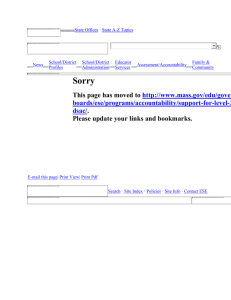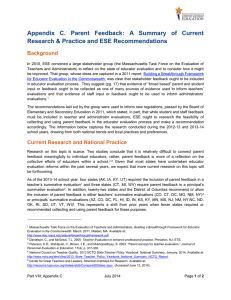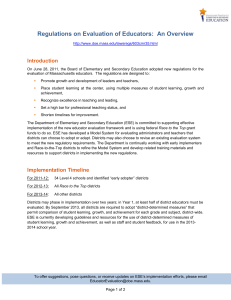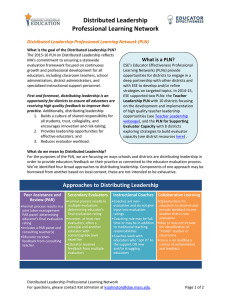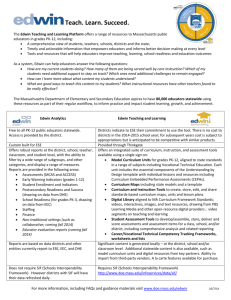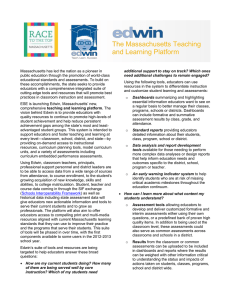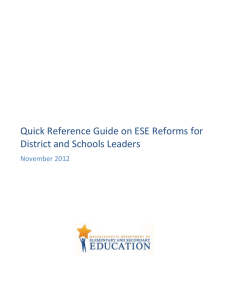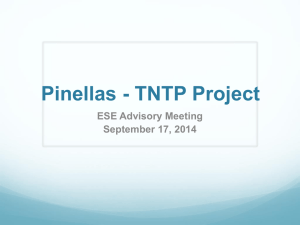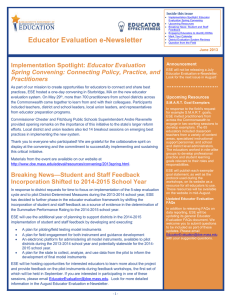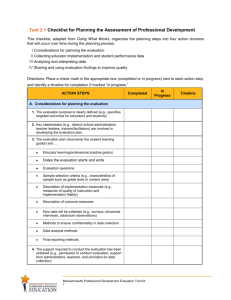Strategic Plan - Massachusetts Department of Education
advertisement
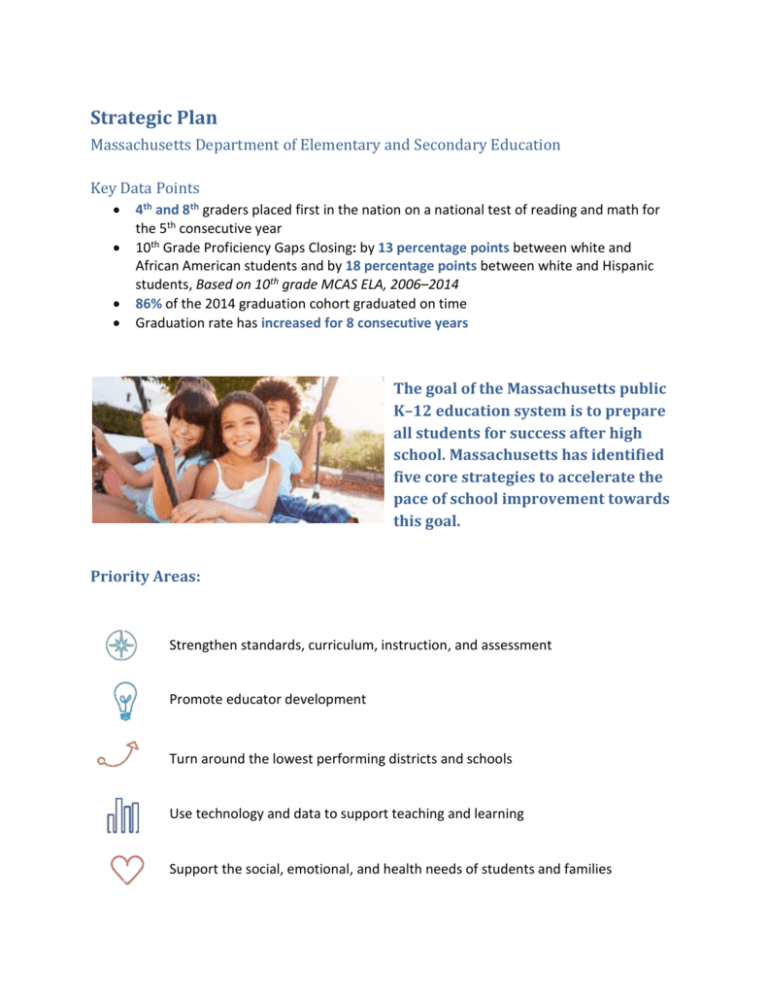
Strategic Plan Massachusetts Department of Elementary and Secondary Education Key Data Points 4th and 8th graders placed first in the nation on a national test of reading and math for the 5th consecutive year 10th Grade Proficiency Gaps Closing: by 13 percentage points between white and African American students and by 18 percentage points between white and Hispanic students, Based on 10th grade MCAS ELA, 2006–2014 86% of the 2014 graduation cohort graduated on time Graduation rate has increased for 8 consecutive years The goal of the Massachusetts public K–12 education system is to prepare all students for success after high school. Massachusetts has identified five core strategies to accelerate the pace of school improvement towards this goal. Priority Areas: Strengthen standards, curriculum, instruction, and assessment Promote educator development Turn around the lowest performing districts and schools Use technology and data to support teaching and learning Support the social, emotional, and health needs of students and families SUCCESS FOR EVERY STUDENT Understanding the Commonwealth’s Strategic Plan for Education Massachusetts students are outperforming their peers across the nation on many indicators of academic performance. Building upon previous successes, the Department of Elementary and Secondary Education is committed to strategies centered on a foundational belief that given the right supports, all students can succeed after high school. Strengthen standards, curriculum, instruction, and assessments The Common Core-aligned Massachusetts Curriculum Frameworks (MA Frameworks) are designed to increase academic rigor and raise expectations statewide. ESE is providing districts with a broad set of supports, including model curriculum units (MCUs), World-class Instructional Design and Assessment standards for English language learners (WIDA), and professional networks. MCUs were developed by ESE to provide educators with examples of lesson plans, assessments, and other content aligned to the frameworks. By supporting districts through specialized standards, statewide professional networks, and MCUs, ESE aims to strengthen the implementation of a more rigorous curriculum for all students. Promote educator development ESE aims to ensure that all students have access to highly skilled educators by supporting a cycle of continuous improvement and identifying opportunities to recruit and retain highly effective educators. The Commonwealth’s approach to educator evaluation involves setting high standards, evaluating educators based on those standards, and providing targeted professional development based on evaluation data. ESE is also engaged in strengthening the educator workforce by implementing more rigorous educator preparation program review standards, developing performance assessments for leaders and teachers, and efforts to promote greater diversity among classroom educators. Turn around the lowest performing districts and schools The state’s lowest performing schools require additional resources and research-based interventions to support their rapid improvement. Each underperforming school develops a turnaround plan, which involves changes to policies and practices to catalyze dramatic and sustained improvement. Many turnaround schools also receive additional funding, giving them an opportunity to engage with proven turnaround partners to accelerate the improvement process. Use technology and data to support teaching and learning The agency aims to promote effective data use in classrooms by equipping educators with useful reports and providing support on their use. Edwin Analytics provides preschool through postsecondary data to support effective instruction and includes a tool to identify students at risk of not meeting a key academic goal. ESE is helping schools access technology tools and expertise to support digital literacy among students and prepare them for a 21st century economy. Support the social, emotional, and health needs of students and families Removing non-academic barriers to learning and developing students’ social and emotional competencies helps schools create safe and supportive learning environments that contribute to academic achievement. ESE is addressing these issues through the Wraparound Zone Initiative, the Massachusetts Tiered System of Supports (MTSS), safe and supportive schools programs, and other nutrition, health, and safety initiatives. These efforts recognize the positive impact that focusing on students' emotional and health needs, improving school climate, and building school-community partnerships can have on student performance and on turning around underperforming schools. Measuring our success The Commonwealth’s plan for continuous improvement addresses the range of factors that affect learning, both inside and outside the classroom. We will measure our success through an increase in: Four- and five-year graduation rates Achievement in our lowest-performing schools and districts Completion of a rigorous high school program of study Postsecondary enrollment and success Reading, math, and science performance on state, national and international assessments Retention of highly effective and diverse educators Please visit http://www.doe.mass.edu/commissioner/default.html for more information about ESE’s strategic plan.
